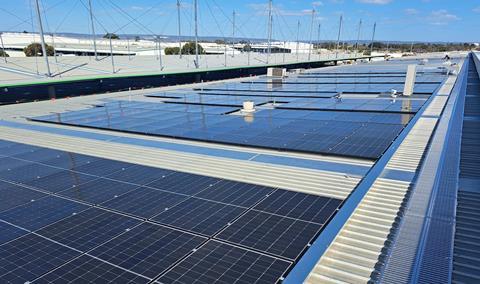Once complete it will be the largest rooftop solar system in the state, reducing the site’s carbon footprint

Perth Markets Group (PMGL) has commenced installation on a new rooftop solar system at its 51ha Canning Vale site. This A$10mn project is expected to reduce the site’s carbon footprint by 3,910 tonnes annually.
Phase one of the installation of PMGL’s solar renewable energy integration plan commenced in early October and will span over 12 months. Once complete, the rooftop solar system will be the largest in the state, taking up 25,000m² of rooftop, with an output capacity of 5MW.
The installation of approximately 10,000 photovoltaic (PV) modules is expected to be completed in the third quarter of 2025 and will supply one third of the Perth Markets site’s electricity consumption. It will generate enough power for approximately 850 average households.
PMGL chief executive, Scott Gibson, expressed the importance of the solar investment.
“This is a huge investment for us and one that has required considerable planning,” he said.
“Perth Markets and its 120 tenants consume an enormous amount of electricity, primarily through powering the cold chain infrastructure needed to deliver fresh produce to West Australians.
“With its integrated battery system, we are also projected to reduce site grid load by up to two hours during peak demand, easing pressure on the electricity network, particularly during the hottest days.”
This solar project marks a pivotal shift towards PMGL’s more sustainable energy practices.
PMGL is a horticultural industry-based facility owner, manager and developer. The purpose-built 51ha site is home to Western Australia’s only wholesale fresh food central trading market, as well as the retail and commercial precinct, Market City, and the Canning Vale Weekend Community Markets.
Perth Markets provides the critical link between growers, wholesalers, retailers and the fresh food supply chain. With more than 250,000 tonnes of produce traded through the market in the 2024 financial year, the site contributes significantly to the horticultural industry and Western Australia’s economy.



